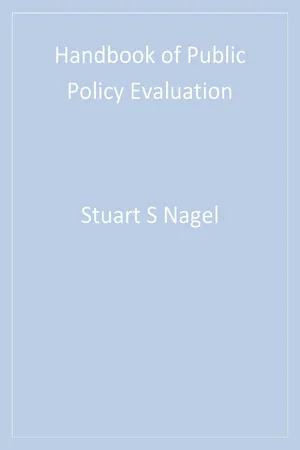
- 424 pages
- English
- PDF
- Available on iOS & Android
Handbook of Public Policy Evaluation
About this book
Handbook of Public Policy Evaluation is the only book of its kind to present aspects of public policy evaluation that relate to economic, technology, social, political, international, and legal problems. Rather than looking at specific narrowly focused programs, this book emphasizes broad-based evaluation theory, study, and application, providing a rich variety of exceptional insights and ideas.
Designed to facilitate integration and coherence, key features in this volume include:
- Systematic evaluation, measuring the policy alternatives available for achieving goals
- Win-win evaluation, processing policy alternatives that can enable conservatives, liberals, and other major viewpoints to all come out ahead of their best initial expectations simultaneously
- Policy evaluation, offering methods, examples, studies, professionalism, perspectives, concepts, trends, substance, theory, applications, dispute resolution, interdisciplinary interaction and bibliographies and applications
The book targets the need for improvement in the methods, processes, and substance of public policy and opens the gate of public policy to be more effective, efficient, and equitable. Policymakers, administrators, analysts, and practitioners alike will find the Handbook a necessary resource of alternative public policies that are placed in context with a direct course to positive results.
Frequently asked questions
- Essential is ideal for learners and professionals who enjoy exploring a wide range of subjects. Access the Essential Library with 800,000+ trusted titles and best-sellers across business, personal growth, and the humanities. Includes unlimited reading time and Standard Read Aloud voice.
- Complete: Perfect for advanced learners and researchers needing full, unrestricted access. Unlock 1.4M+ books across hundreds of subjects, including academic and specialized titles. The Complete Plan also includes advanced features like Premium Read Aloud and Research Assistant.
Please note we cannot support devices running on iOS 13 and Android 7 or earlier. Learn more about using the app.
Information
Table of contents
- Cover
- Contents
- Introduction
- Section I: FOUNDATION IDEAS
- Part 1: WIN-WIN METHODS
- 1 - Win-Win Analysis Summarized
- 2 - The Big Tradeoff: Fundamental Law or Red Herring?
- 3 - Win-Win Equity
- 4 - Lose-Lose and Win-Win Policies
- 5 - Graphic Approaches to Understanding Super-Optimizing
- Part 2: WIN-WIN EXAMPLES
- 6 - Preventing Sexual Harassment While Preserving Academic Freedom: A Win-Win Analysis
- 7 - Two Super-Optimum Solutions in a Cutback Mode
- 8 - University to Industry Transfer
- 9 - Profit Sharing and Job Anxiety: Moving Public Policy Toward a Win-Win Solution
- 10 - Another Win-Win Occurrence
- Part 3: PUBLIC POLICY STUDIES
- 11 - Policy Evaluation Questions
- 12 - Integrating Institutions and Implementation Into Policy Decisions
- 13 - Public and Private Sectors for Administering Public Functions
- 14 - Sherman the Shark on Policy Evaluation
- Part 4: POLICY PROFESSIONALISM
- 15 - Productivity for Success
- 16 - Professionalism Books for Graduate Students and Others
- 17 - Survey on Running a Policy Program
- 18 - Academic Tyranny: The Tale and the Lessons
- Part 5: POLICYMAKER PERSPECTIVES
- 19 - Public Health Challenges
- Section II: POLICY EVALUATION AT THE CUTTING EDGE
- Part 1: BASIC CONCEPTS
- 20 - Policy Theory
- 21 - Building Frameworks for Policy Analysis
- 22 - Causal Relations Among Policy Fields
- Part 2: METHODS AND PROFESSIONALISM
- 23 - Diverse Methods for Policy Analysis
- 24 - Interactive Policy Analysis: Process Methods for Policy Reform
- 25 - Changing Policy Research
- 26 - Recruiting People and Obtaining Funds
- 27 - Funding for Policy Evaluation
- Part 3: POLICY EVALUATION TRENDS
- 28 - Trends in Cross-Cutting Procedural Policy Issues
- 29 - Public Policy in the 20th Century
- 30 - The Future of the Policy Studies Organization
- Part 4: POLICY EVALUATION SUBSTANCE
- 31 - Welfare Reform
- 32 - “Ordinary” Injustice: A Memo to the Editor
- 33 - Congressional Campaign Reform
- 34 - Violence, Guns, Media, and Fathers
- Part 5: WIN-WIN THEORY
- 35 - Super-Optimizing Solution Graphing
- 36 - Win-Win Game Theory
- 37 - Win-Win Mediation
- 38 - Win-Win Allocation
- 39 - Inconsistent Reactions to Win-Win Analysis
- Part 6: WIN-WIN APPLICATIONS
- 40 - Coeffects Diagrams and Win-Win Analysis
- 41 - Win-Win Economics
- 42 - Super-Optimization: A New Approach to National Environmental Policymaking
- 43 - Win-Win Decentralizing
- 44 - Win-Win Justice
- Section III: POLICY EVALUATION BIBLIOGRAPHIES
- Part 1: POLICY EVALUATION IN GENERAL
- 45 - Core Bibliography and Background
- 46 - Policy Problems or Subfields
- Part 2: POLICY STUDIES ORGANIZATION BOOKS
- 47 - Policy Studies Organization Policy Books
- 48 - Recent Policy Studies Organization Policy Books
- 49 - The Impact of Policy Studies Organization Books
- Part 3: ALTERNATIVE DISPUTE RESOLUTION (ADR) AND SUPER-OPTIMUM SOLUTION (SOS)
- 50 - Alternative Dispute Resolution
- 51 - Literature Relevant to Super-Optimum Solutions
- 52 - Super-Optimum Solution Publications
- 53 - Bibliography From Creativity in Public Policy: Generating Super-Optimum Solutions
- 54 - Further Reading on Super-Optimum Solutions
- Part 4: PROFESSIONALISM IN POLICY EVALUATION
- 55 - Obtaining Funding
- 56 - Getting Published
- 57 - Finding an Academic Niche
- 58 - Creativity
- Part 5: PUBLIC POLICY AND OTHER DISCIPLINES
- 59 - Natural Science
- 60 - Humanities
- 61 - Social Science
- Part 6: SPECIAL RESOURCES
- 62 - Policy Problems by Developing Regions
- 63 - Policy Studies Organization Books
- 64 - Legal Policy
- Index
- About the Editor